Foreign Minister Edward Nalbandian’s visit to Berlin
15 March, 2010On March 15, Foreign Minister of Armenia Edward Nalbandian paid an official visit to Berlin.
Armenian Foreign Minister met with Guido Westerwelle, Deputy Chancellor and Federal Foreign Minister.
The meeting between Ministers Nalbandian and Westerwelle took place in tête-à-tête and enlarged formats.
Minister Nalbandian thanked his German colleague for the invitation to visit Berlin and warm reception. Speaking on bilateral relations, Minister said. “Armenian attaches a great importance to the further deepening and strengthening of comprehensive cooperation with Germany, one of the founding and leading countries of the European Union”. Armenian Foreign Minister mentioned with satisfaction that Germany is one of the biggest investors in the Armenian economy and it provides a continuous support to the projects aimed at the development of Armenia.
They both stressed that high-level political dialogue is established between the two countries, partnership within bilateral and multilateral formats is effectively developing, a solid legal field is formed, business ties, as well as cooperation in cultural and educational areas are widening.
Foreign Ministers of Armenia and Germany touched upon the preparations of the upcoming official visit of the President of the Republic of Armenia to Germany.
Within the context of discussions on the expansion of economic relations Minister Nalbandian mentioned with satisfaction that more than forty companies with the German capital are working in Armenia and in the near future through the joint efforts their amount could be doubled.
The two also had a discussion on the perspectives of cooperation in the areas of culture and education and the implementation of the joint projects. Ministers discussed the possibility of opening the Goethe Institute in Yerevan.
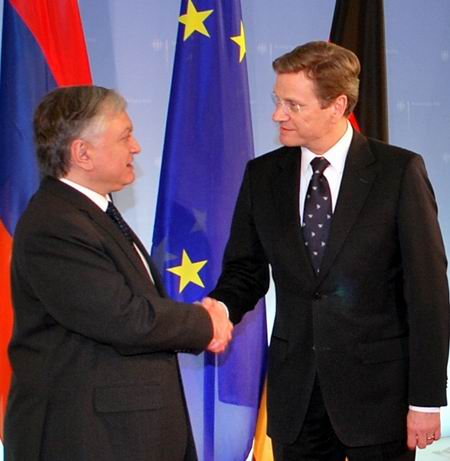
Foreign Minister of Armenia and Germany touched upon the issues concerning the enhancement of stability and security in the Caucasus region.
On the request his German counterpart Minister Nalbandian presented the recent developments in the negotiations on the settlement of Artsakh (Nagorno Karabakh) issue. They both attached importance to the settlement of the issue by peaceful means according to the statements of the OSCE Foreign Ministerial Councils in Helsinki in 2008 and Athens in 2009, as well as to the continuation of negotiations based on the Madrid Proposals.
Ministers touched upon Armenia-European Union relations, the cooperation within the frameworks of the Eastern Partnership Program, the facilitation of visa regime.
In the course of the meeting, they discussed the process of normalization of Armenian-Turkish relations. Minister Nalbandian mentioned. “If Turkey really wants the continuation and success of this process then it should avoid speaking with the language of preconditions, seeking artificial reasons for delays and undertake concrete steps for the ratification and implementation of the Protocols”. Edward Nalbandian assured that Armenia is pursue the progress of the process initiated by itself and expects the same from Turkey.
Minister Westerwelle mentioned that Germany has welcomed and supports all the efforts that will lead to the establishment of normal relations between Armenia and Turkey and to the opening of the border.
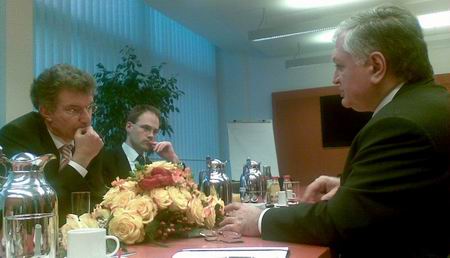
On the same day, Edward Nalbandian also had a meeting with Christoph Heusgen, the senior adviser of Chancellor Angela Merkel on foreign policy and security issues. The two had a comprehensive discussion on the issues concerning the visit of the President of Armenia, the ways of more strengthening of Armenian-German friendly relationship, as well as a wide range of international and regional issues.
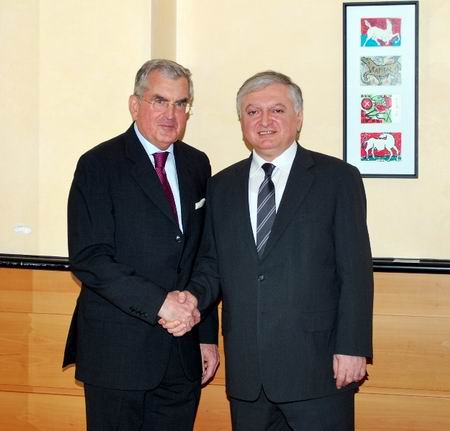
In the course of the meeting with the State Secretary at the Foreign Office Wolf-Ruthart Born a number of issues of mutual interest was discussed.
In Berlin Minister Nalbandian also visited Bundestag where he had a meeting with the Chairman of the Committee on Foreign Affairs Ruprecht Polenz and the members of the Committee.
Minister Nalbandian mentioned that the parliamentary diplomacy is an important format for the development of relations between the countries and welcomed the initiative of the deputies of Bundestag aimed at the further deepening of Armenian-German relationship.
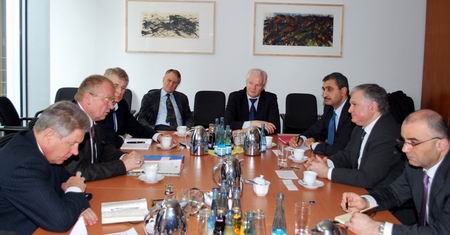
They had a detailed discussion on regional issues – Armenian-Turkish relations, settlement of Artsakh issue. Ruprecht Polenz on behalf of his Committee welcomed the efforts aimed at the normalization of Armenian-Turkish relations and expressed hope that this historic chance would not be missed and the expectations of international community would be realized.
During the talks, the current stage and perspectives of cooperation between the Parliaments of Armenia and Germany, as well as cooperation between the members of parliaments were discussed.
On the same day in the evening Foreign Minister of Armenia visited the German Council on Foreign Relations where he delivered a comprehensive speech on Armenia’s foreign policy, answered the questions of MFA high-level officials, diplomats, political scientists, experts and journalists that attended the meeting.
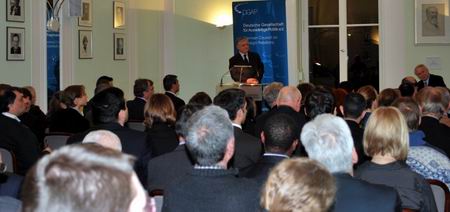
Speaking on the statements made by Turkey during the recent days Minister Nalbandian said. “Today Turkey uses the normalization process as a smokescreen for their baseless argument that the passage of resolutions on the Armenian Genocide in the US House of Representatives, Swedish Parliament or elsewhere can damage the normalization process. At the same time Turkey itself spares no effort to create obstacles and difficulties for the process, by putting forward preconditions and undermining the very logic of reasonable timeframe.”. Minister expressed hope that Turkey will realize the weight of responsibility for consequences of such a behavior and will not disappoint the international community.
In Berlin Foreign Minister of Armenia participated in the press conference organized for the representatives of German and international media.
After Berlin, Edward Nalbandian left for Paris for a working visit.

